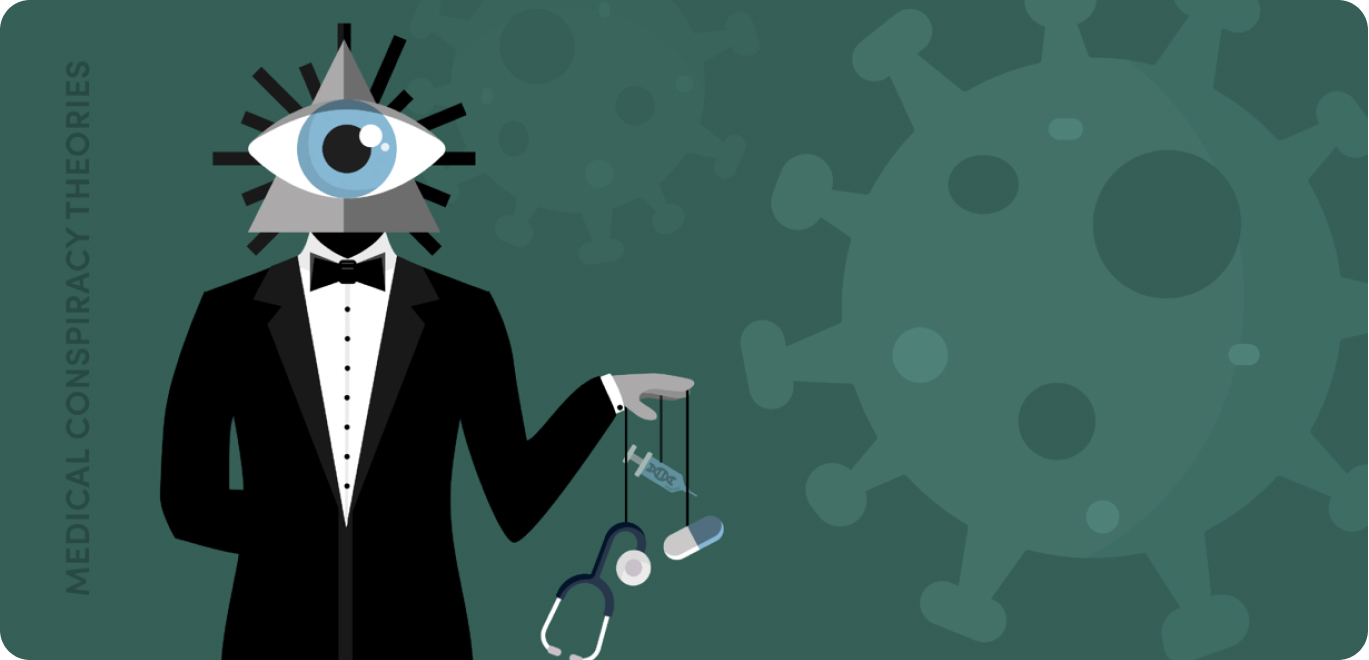
The first 2022 global medical conspiracy theories are already here

If 2020 taught us anything, it’s that we suffer from more than 1 global disease. There’s paranoia (as proven by the rise of mental health issues caused by the economic crisis); panic (as demonstrated by compulsive buying of toilet paper); and healthcare systems that never really worked in the first place.
But perhaps, the sneakiest and the most damaging of them all was an umbrella term we all have heard in various contexts: disinformation.
2021 has been all about dealing with the consequences of what occurred, so it’s time to look at what it means for us moving forward. More specifically, how spreading dangerous conspiracy theories in 2022 may affect the most valuable and vulnerable part of our socio-economical system: medicine.
Jump to a section
- What do we talk about when we talk about conspiracy theories?
- Why is it important?
- Why is the global cabal theory virus so catchy?
- Medical-related conspiracy theory no.1: Vaccine resistance diagnosed as a mental illness.
- Medical-related conspiracy theory no.2: Blame it on the... 5G or AI?
- Medical-related conspiracy theory no.3: MedTech companies are out to get us!
- What can you do about it?
What do we talk about when we talk about conspiracy theories?
The most popular form of medical disinformation is conspiracy theories. Or to use the more scientifically-friendly term global cabal theories - stories arguing that underneath the myriad events we see on the surface of the world lurks a single sinister group. It’s a belief in someone or some controlling group is “behind all of this”; be it a special unit of the government, Satanists, or aliens.
Such theories have been around for thousands of years. According to Yuval Noah Harari (a historian and the author of Sapiens: A Graphic History), the most famous one is perhaps nazism - a global cabal theory based on an anti-Semitic lie that Jewish financiers dominate the world and plot to destroy the Aryan race.
More recently, in the digital era, a moment that started a real outburst of global cabal theories was fake news charges during the US 2016 election campaign. What followed were an overwhelming number of online channels that united a growing number of theory-believers and increasing distrust in anyone not agreeing with them, including experts, historians, and doctors. The seed for contemporary medical disinformation was planted.

Testing the title of the image - More recently, in the digital era, a moment that started a real outburst of global cabal theories was fake
Why is it important?
These dangerous theories thoroughly affect anyone’s worldview. It’s hard to discuss history if someone does not believe in the moon landing or Holocaust for that matter. Even more difficult to discuss geography when you’re talking to a Flat Earther.
So in times of global crisis, when all the scientific fields (economy, medicine, politics, among others) play an equally important part in battling the emergency, the outburst of such stories increases.
The result? In the case of the Covid-19 outbreak, the list of pandemic-related medical conspiracy theories included, but was not limited to:
- vaccine implanting microchips used to track people;
- Covid fatality rate being wildly inflated;
- and yes, Bill Gates created the virus and he uses it to control the population.
All of them proving that, in the long run, sharing falsehood limits the usage and accessibility of medical solutions.
Why is the global cabal theory virus so catchy?
3 reasons:
- These theories support egocentric points of view. Learning about conspiracy theory makes the person interested to appear as knowledgeable.
- They offer a single, straightforward explanation for countless complicated processes. When hearing horrific stories, having 1 piece of information justifying everything can actually be comforting.
- Because we created tools for spreading it. And hardly any guards to avoid it. The first tool that comes to mind is the internet. More specifically, social media profiles that can influence hundreds of thousands of followers + accounts with questionable political agendas + accounts with even more questionable origins. But it’s deeper than that.
Misinformation is not just sharing a single narrative but conducting a wide campaign - a set of actions and reports produced and spread to deceive, usually for political purposes. It is creating murky blends of truth, lies, and sincere beliefs. In other words, it’s less about a single piece of (dis)information and more about limiting all the news.
All the trends mentioned above are here to stay. We will continue to look for reliable news online. Less-qualified people (be it politicians or online personas) will gain more power, and more global misfortunes (such as climatic disasters) will come our way. The line between common sense and the unimaginative will get more blurry.
This is why monitoring and analyzing the key themes in the global disinformation campaigns is so relevant. Not sharing medical misinformation, but pointing out its possible outcomes - case by case
Let’s take a look at the origin of possible 2022 medical conspiracy theories:

Image by: Karolina Klimek from the Untitled Kingdom
Medical-related conspiracy theory no. 1: Vaccine hesitancy diagnosed as a mental illness.
Can you imagine next Easter or Thanksgiving? Neither can we, but it’s certain that the further vaccination rollout will hugely impact our plans anyway.
The enemy in this story? The government. Regardless of the medical accuracy of the accusations against the vaccine, governments will take a direct, even confrontational, approach to dismantle anti-vaccine groups.
Vaccine skeptics will need to come up with new explanations for their struggles. And what is the easiest way to pass through mandatory vaccinations? Treat ones who avoid as incapable of making their own decisions. This simple explanation would be convenient, especially in the US, where the official vaccination policy does not include mentally ill patients.
To stop it sharing stories about unvaccinated people needs to be done objectively and with respect. Without any hurtful comparisons or insensitive conclusions. Be less like Arnold Schwarzenegger and more like your friendly educational portal.
Medical-related conspiracy theory no.2: Blame it on the... 5G or AI?
3-minute video on 5G medical conspiracy theory by Global News
One of the most creative examples of 2020 medical disinformation was the belief that 5G is tied to the Covid-19 outbreak. And though the images of cellular towers on fire (in the US, Quebec, Belgium, and the Netherlands) may still hunt you in years to come, 5G may already be passé next year.
The next big thread may lay in the public’s understanding of the use of AI (Artificial Intelligence) in healthcare.
The enemy in this story? Technology’s effect on human health.
On the one hand, AI has made great advances in pharma and biotech efficiency and has already supported the medical staff tremendously. Examples? Algorithms help in identifying patients with cardiovascular disease and predicting their mortality risk and help patients with maintaining their diet.
On the other hand, despite many trials, none of the medical AI tools helped doctors during the Covid-19 outbreak and, out of hundreds, only 2 have been singled out as promising enough for future testing
And with the public’s lacking understanding of how Artificial Intelligence works combined with the (often) poor data quality that researchers use to develop their AI tools, it may just be another conspiracy theory in the making.
To stop it we should focus less on explaining things to the public but rather address their main concerns. Story by story. Answer all the questions on:
data collection and data privacy - is it safe to share my personal data to improve artificial intelligence technology?
automation - is AI going to replace doctors?
bias - can algorithms be coded “unfairly” to discriminate against minorities or prioritize profits rather than providing optimal care?
Medical-related conspiracy theory no.3: MedTech companies are out to get us!
When people seek health information, they expect it to be reliable and accurate. Yet their expectations can be dashed, especially by digital health devices, many of which are not reviewed by the FDA (Food and Drug Administration) or other regulatory bodies.
There are far too many examples, from period tracker apps offering incorrect clinical information to applications using artificial intelligence algorithms incorrectly diagnosing people of color with skin cancers.
To stop it we may start by realizing that... it’s very likely to be true.
Plenty of institutions developing medical technology do not have our best interest in mind. Plus, from a financial standpoint, they are far less likely to create more sophisticated (therefore more expensive) solutions.
The enemy in this story? Following the blind need for innovation.
The idea of digital health applications is noble. It allows individuals to take control of their health, and it gives medical staff more data to use to treat their patients. But the current regulatory landscape for digital health apps leaves much to be desired.
In the US, the FDA regulates all medical devices. Still, since most digital health apps are meant to be used only for monitoring and recording symptoms — and not treating the disease — they are not regulated. Additionally, they are held and approved as “final products” with a difficult process to update or modify frequently. This means that any software upgrade, artificial intelligence algorithm update, or addition of clinical recommendations needs to go through a long verification process.
Perhaps, sharing this medical conspiracy theory is, in fact, reasonable:
Patients still seem to be rarely included in the development of new medical solutions.
What can you do about it?
Notice any common thread through all these medical conspiracy theories?
It’s technology.
And technology is what should put an end to it.
Actions speak louder than words. If doubt and medical misinformation start in the digital world, it's digital health solutions that should prove these theories wrong. If you’re a storyteller, share the right examples in the right way. If you are developing such solutions, join us.
In our software and product development company, we believe that technology starts with equality. We do not just work on any projects. We choose partners that want to develop devices that can truly, positively impact people’s health.
How do we do it? At the Untitled Kingdom, we stay up to date, keep our eye on the medical trends, closely analyze the MedTech market, and create software that is aligned with FDA, HIPAA and ISO 13485 requirements.
But most importantly: we follow a user-centric approach, always keeping in mind accuracy, usability, accessibility, and data privacy. It guides our practice.
With over 13 years of developing medical web & mobile apps, we see that in the wake of medical misinformation, the importance of digital health solutions is greater than ever. We are looking for partners who can use our software & product development knowledge proven by more than 75 delivered apps (and counting!). Partners who wish to create an outstanding digital health product.
If you want to talk to me about a possible cooperation, you can…
